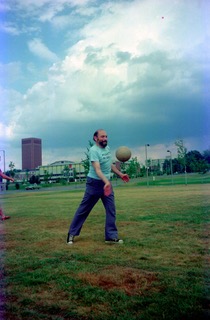From Joe Pater
This year is a good candidate for the 25th anniversary of Optimality Theory. 1993 marks not only the publication date of Prince and Smolensky’s book as a technical report, but also the year of the establishment of the Rutgers Optimality Archive (tell that to your ArXiv-loving CS friends!).
This seems like a good occasion to reflect and reminisce, so I thought I’d start this discussion thread. I had an earlier chance to reflect on the history and status of violable constraints in phonology at the 2015 mfm “Whither OT” fringe workshop. My handout, and some related discussion, can be found here: https://websites.umass.edu/comphon/2015/05/29/discussion-whither-ot-handout/. At the same date as that workshop, a celebration of Alan Prince’s career was held at Rutgers, at which he was presented with the Short ‘Schrift (Bakovi? ed.): https://princeshortschrift.wordpress.com. This multimedia volume contains lots of relevant material to browse. Marc van Oostendorp has recently circulated his history of OT. The story of the beginning of Prince and Smolensky’s collaboration is told by the protagonists here: https://websites.umass.edu/brain-wars/the-debates/prince-vs-smolensky/. Finally, the handouts from Prince and Smolensky’s 1991 Linguistic Institute course, which include the 1991 Arizona Phonology conference handout “Optimality” (another candidate birthday) are here: http://www.cs.colorado.edu/department/publications/reports/docs/CU-CS-533-91.pdf.
I don’t have any more serious reflections or general historical notes to add at this point, so I’ll just add a few reminiscences. I was a PhD student at McGill in 1993 when Prince and Smolensky’s manuscript appeared in Glyne Piggott’s mailbox. We made bound copies at the copy shop, and got reading. I have a crystal clear memory of reading it on the shore of Loughborough Lake that summer, thinking “this isn’t how everyone says phonology works”. I was skeptical for a while, especially about the claim that there were no rules (what was Gen, after all?), and it did take a lot of work to understand any of it. But I ended up being an early adopter, mostly because it allowed me to formalize some ideas I had about English stress.
I had the great fortune of being accepted as an alternate at the 1994 Prosodic Morphology conference in Utrecht, where John McCarthy nicely invited me to come sit in on his seminar in Correspondence Theory at UMass (I wish the Amtrak Vermonter still went all the way to Montreal!). I thus got to spend a lot of time interacting both with people working in OT, as well as with OT-skeptics (many Canadian phonologists, including my advisors at that time), which I think was a really good learning experience.
Another crisp memory of the early OT days is the “Is the Best Good Enough?” conference at MIT. Despite the somewhat tendentious title, the call also emphasized potential common ground between OT and Minimalism, which at that point included notions like minimization of derivational length. In his talk, Chomsky abandoned that common ground, claiming that comparison of derivations was problematic on computational grounds. I wish I could remember the exact phrase – it was something like “obviously computationally intractable”. In the question period, Smolensky asked him to elaborate, citing his own work with Tesar on computing OT. As I recall, Chomsky said something that didn’t answer the question.



